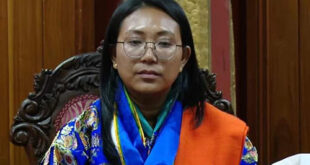A unique feature of the 12th Fine Year Plan (FYP) are Flagship programmes for which Nu 15 bn has been allocated. This is there in the 12 FYP guidelines approved by the Cabinet.
Flagship programmes are high priority multi-sector interventions to address national issues. The programmes will undertake end to end intervention and multiple agencies or Dzongkhags will work together under one programme to address the issue.
Flagship programmes will have detailed blueprint with carefully thought out end to end implementation plans and activities, resources and milestones that must be implemented to realize the results of the programmes.
Flagship programmes will be undertaken in addition to regular routine programs and will receive earmarked fund. The programmes will be rigorously monitored with regular submission of updates to the Prime Minister and the government to ensure effective delivery through real time problem solving.
Based on national significance of the issues and potential for yielding high socio-economic impact, the Gross National Happiness Commission has identified the following tentative flagship programmes for the plan.
Integrated Water Security
Water is one of the most important natural resources for livelihood, developing the economy and sustaining the natural environment. The 12 FYP guideline says there is increasing pressure on the quantity and quality of our water resources because of rapid socio-economic development, the effects of which are further exacerbated by climate change.
There is now growing concern on water availability for drinking supply and for agriculture as many spring water sources are drying up, and there is minimal flow in winter for hydropower generation.
The Programme is expected to ensure that the water resources are protected and managed in an economically efficient, socially equitable and environmentally sustainable manner. It is to ensure that every household has access to safe and reliable drinking water and our fields are connected
with reliable functional irrigation. The lead will be taken by the National Environment Commission with key partners being the Ministry of Agriculture and Forests (MoAF), Ministry of Economic Affairs, GNHC and the Ministry of Works and Human Settlement.
Economic Diversification
Hydropower development and the subsequent export of surplus electricity to India have largely sustained the growth Bhutan has achieved over the years. The plan guideline says that, however, the country’s economic growth eventually has become dependent on the hydropower project cycle and related construction while other sectors remain relatively underdeveloped except to some extent tourism.
It says heavy reliance on one major sector however, makes the country vulnerable to any external shocks. Generation of employment opportunities by hydropower has also been minimal.
Therefore, concerted effort will be made to explore and develop industries other than hydropower including cottage and small industries. The programme is expected to yield increased employment opportunities and improved trade balance.
Projects emanating from this programme may be operated by public or private sector depending on the nature of the project. For instance, commercially viable projects with minimal social obligations and strategic interest for the government may be operated by the private sector. Similarly, projects requiring high upfront cost may be operated through Public Private
Partnership. Clear modus operandi of the projects will be spelt out in the blueprint of the programme.The Economic Development Policy 2016 spells out the lead and key partners.
Quality of Education
The report says that while a great deal of success has been achieved in terms of access to school and enrollment numbers, this Programme is about improving the quality of education including the technical education.
Doing so will ensure that the youth coming out of schools are in position to apply their knowledge and skills to real-life situations and the nation’s human resource requirement are addressed in the long-run.
The lead agency will be the Ministry of Education with key partners from RUB, REC, BCSEA, MoLHR, GNHC and private schools.
Livelihood of Vulnerable Groups
While the general section of the population are covered through the mainstream development programmes certain section of the society would remain unreached and therefore are socio-economically vulnerable requiring targeted development intervention.
The report says that hence, livelihood opportunities of the vulnerable groups including people living under poverty, youth and old-aged will be undertaken to address their needs.The lead will be taken by GNHC and all agencies and CSOs will be key partners.
Improving Highlands Livelihood Programme
Although remote and mountainous regions of the country are not densely populated, the hilly
terrain and difficulty of access together with limited infrastructural constraints poses an immense challenge to development efforts and attempts in improving the livelihoods of the people.
It says many of the Highland settlements have limited access to most of the social services. The programmes will therefore aim to improve the quality of life of the undeserved inhabitants of
highland through three-pronged approach of increasing income generating capacity, sustainable management of natural resources and increasing the opportunities in accessing social services such as health and education. The lead agency is the MoAF and key partners are NLC, NEC, MoIC, MoH, MoE and GNHC.
The lead agency will establish a Steering Committee for each programme with clear Terms of Reference after which the lead agencies shall conduct in-depth study on the flagship
programmes and develop a blueprint for each programme.
The blueprints will clearly spell out implementation plan including the milestones, roles and responsibilities of collaborating agencies, cost estimates, risks and risk mitigation measures for the respective programme.
The Steering Committees shall submit their programmes to the GNHC. Subsequently, the programmes recommended by GNHC shall be submitted to the Cabinet for approval.
Local Governments can also propose flagship programmes. Such proposals have to be across multiple Dzongkhags and focused on areas and themes identified above.
The programme shall be monitored by the steering committee on a fortnightly basis. The programme will be monitored by GNHCS and reported to the Prime Minister on a quarterly basis or as may be agreed or directed. The Cabinet shall review the progress of all programmes every six months.
 The Bhutanese Leading the way.
The Bhutanese Leading the way.



